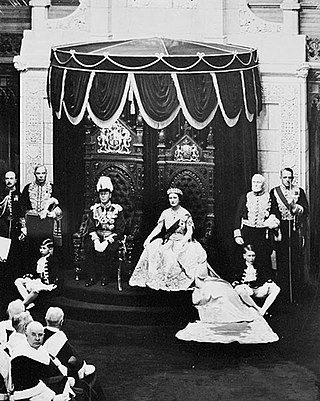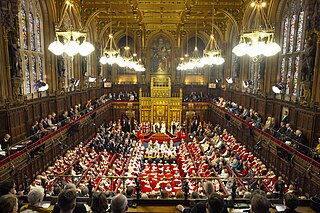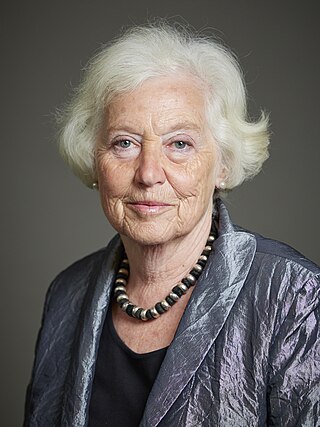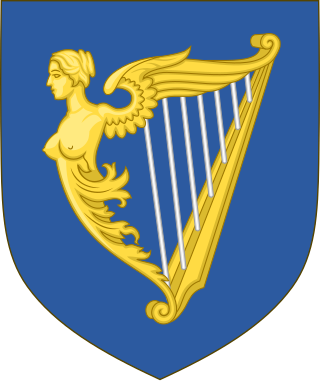
The Woolsack is the seat of the Lord Speaker in the House of Lords, the Upper House of the Parliament of the United Kingdom. Before 2006, it was the seat of the Lord Chancellor.

The Woolsack is the seat of the Lord Speaker in the House of Lords, the Upper House of the Parliament of the United Kingdom. Before 2006, it was the seat of the Lord Chancellor.
In the 14th century King Edward III (1327–1377) said that his Lord Chancellor whilst in council should sit on a wool bale, now known as "The Woolsack", in order to symbolise the central nature and great importance of the wool trade to the economy of England in the Middle Ages. [1] [2] Indeed, it was largely to protect the vital English wool trade routes with continental Europe that the Battle of Crécy was fought with the French in 1346. [3]
In 1938, it was discovered that the Woolsack was, in fact, stuffed with horsehair. When it was remade, it was re-stuffed with wool from all over the British Commonwealth as a symbol of unity. [4]
From the Middle Ages until 2006, the presiding officer in the House of Lords was the Lord Chancellor and the Woolsack was usually mentioned in association with the office of Lord Chancellor. In July of that year, the function of Lord Speaker was split from that of Lord Chancellor under the Constitutional Reform Act 2005, with the former now sitting on the Woolsack. [5]
Until 1949, Canada's Senate also had a judges' woolsack. At the behest of Jean-François Pioulot, an MP from Quebec, who decried the use of a cushion on which the Supreme Court of Canada's judges had to sprawl "like urchins," the woolsack was eventually abolished and replaced with conventional chairs. The original woolsack is still extant. [6]

The Woolsack is a large, wool-stuffed cushion covered with red cloth; it has neither a back nor arms, though in the centre of the Woolsack there is a back-rest. The Lords' Mace is placed on the rear part of the Woolsack. [1] The Lord Speaker may speak from the Woolsack when speaking in their capacity as Speaker of the House, but must, if seeking to debate, deliver their remarks either from the left side of the Woolsack, or from the normal seats of the Lords. [7]
If a Deputy Speaker presides in the absence of the Lord Speaker, then that individual uses the Woolsack. However, when the House meets in the "Committee of the Whole", the Woolsack remains unoccupied, and the presiding officer, the Chairman or Deputy Chairman, occupies a chair at the front of the table of the House. [7]

In front of the Woolsack is an even larger cushion known as the Judges' Woolsack. [9] During the State Opening of Parliament, the Judges' Woolsack is occupied by the Lord Chief Justice, the Master of the Rolls, the Presidents of the King's Bench and Family Divisions, the Chancellor of the High Court, the Lords Justices of Appeal and the Justices of the High Court, all of whom are summoned by writ to attend. [10] The Justices of the Supreme Court of the United Kingdom, who are likewise summoned to attend the State Opening, are seated nearby (their predecessors the Law Lords formerly sat on the benches as Lords Temporal).
Gilbert and Sullivan's comic opera Iolanthe is partially set in the grounds of the Palace of Westminster, the meeting place of the House of Lords, and the Lords appear as the male chorus and a fictional Lord Chancellor is a main character. The entire house, as well as the Lord Chancellor, have become attracted to Phyllis, a ward of chancery. The Lord Chancellor laments the fact that propriety would not allow him to marry his own ward, no matter how strongly he may care for her. He describes his position in this way: "Ah, my Lords, it is indeed painful to have to sit upon a woolsack which is stuffed with such thorns as these!"
In Uncommon Law by A. P. Herbert, the newly-appointed Lady Chancellor finds the Woolsack uncomfortable and orders it to be replaced with a chair. Only after it has been removed does one of her fellow Law Lords mention that when presiding on an appeal, she should not have been sitting on the Woolsack anyway. [11]

The House of Lords is the upper house of the Parliament of the United Kingdom. Like the lower house, the House of Commons, it meets in the Palace of Westminster in London, England. One of the oldest institutions in the world, its origins lie in the early 11th century and the emergence of bicameralism in the 13th century.

The House of Commons is the lower house of the Parliament of the United Kingdom. Like the upper house, the House of Lords, it meets in the Palace of Westminster in London, England. The House of Commons is an elected body consisting of 650 members known as members of Parliament (MPs). MPs are elected to represent constituencies by the first-past-the-post system and hold their seats until Parliament is dissolved.

The Palace of Westminster is the meeting place of the Parliament of the United Kingdom and is located in London, England. It is commonly called the Houses of Parliament after the House of Commons and the House of Lords, the two legislative chambers which occupy the building. The building was originally constructed in the eleventh century as a royal palace, and Westminster Hall survives from this era.
Peerages in the United Kingdom form a legal system comprising both hereditary and lifetime titles, composed of various ranks, and within the framework of the Constitution of the United Kingdom form a constituent part of the legislative process and the British honours system. The term peerage can be used both collectively to refer to the entire body of titled nobility, and individually to refer to a specific title. British peerage title holders are termed peers of the Realm.

Whilst the House of Lords of the United Kingdom is the upper chamber of Parliament and has government ministers, for many centuries it had a judicial function. It functioned as a court of first instance for the trials of peers and for impeachments, and as a court of last resort in the United Kingdom and prior, the Kingdom of Great Britain and the Kingdom of England.

Royal assent is the method by which a monarch formally approves an act of the legislature, either directly or through an official acting on the monarch's behalf. In some jurisdictions, royal assent is equivalent to promulgation, while in others that is a separate step. Under a modern constitutional monarchy, royal assent is considered little more than a formality. Even in nations such as the United Kingdom, Norway, the Netherlands, Liechtenstein and Monaco which still, in theory, permit their monarch to withhold assent to laws, the monarch almost never does so, except in a dire political emergency or on advice of government. While the power to veto by withholding royal assent was once exercised often by European monarchs, such an occurrence has been very rare since the eighteenth century.

Parliament House in Dublin, Ireland, was home to the Parliament of Ireland, and since 1803 has housed the Bank of Ireland. It was the world's first purpose-built bicameral parliament house. It is located at College Green.

The Lord Chancellor, formally titled Lord High Chancellor of Great Britain, is the highest-ranking traditional minister among the Great Officers of State in Scotland and England in the United Kingdom, nominally outranking the prime minister. The lord chancellor is appointed by the sovereign on the advice of the prime minister. Prior to the union of England and Scotland into the Kingdom of Great Britain, there were separate lord chancellors for the Kingdom of England and the Kingdom of Scotland. There were Lord Chancellors of Ireland until 1922.
The order of precedence in the United Kingdom is the sequential hierarchy for Peers of the Realm, officers of state, senior members of the clergy, holders of the various Orders of Chivalry, and is mostly determined, but not limited to, birth order, place in the line of succession, or distance from the reigning monarch. The order of precedence can also be applied to other persons in the three legal jurisdictions within the United Kingdom:

The State Opening of Parliament is a ceremonial event which formally marks the beginning of a session of the Parliament of the United Kingdom. It includes a speech from the throne known as the King's Speech. The event takes place in the House of Lords chamber on the first day of a new session, which is traditionally in November, but can occur at any time of year depending on the timing of General Elections and parliamentary session start dates. It takes place in front of a formal gathering of both Houses of Parliament. The monarch, wearing the Imperial State Crown, reads a speech that has been prepared by his or her government outlining its plans for that parliamentary year.
The following is the order of precedence in England and Wales as of November 2023. Separate orders exist for men and women.
The introduction is a ceremony in the House of Lords of the United Kingdom by which a new member is "introduced" to the existing membership. Introductions in the Lords are more elaborate than those in the House of Commons.

Helene Valerie Hayman, Baroness Hayman, is a British politician who was Lord Speaker of the House of Lords in the Parliament of the United Kingdom. As a member of the Labour Party she was a Member of Parliament from 1974 to 1979. When she became an MP at age 25, she was the youngest MP of the 1974–79 Parliament. Hayman became a life peer in 1996.

The Irish House of Lords was the upper house of the Parliament of Ireland that existed from medieval times until 1800. It was also the final court of appeal of the Kingdom of Ireland.

The speaker of the Senate of Canada is the presiding officer of the Senate of Canada. The speaker represents the Senate at official functions, rules on questions of parliamentary procedure and parliamentary privilege, and presides over debates and voting in the chamber. The office of the speaker is held by Raymonde Gagné who has held the position since May 16, 2023.

The Constitutional Reform Act 2005 is an Act of the Parliament of the United Kingdom, relevant to UK constitutional law. It provides for a Supreme Court of the United Kingdom to take over the previous appellate jurisdiction of the Law Lords as well as some powers of the Judicial Committee of the Privy Council, and removed the functions of Speaker of the House of Lords and Head of the Judiciary of England and Wales from the office of Lord Chancellor.

The Lord Speaker of the House of Lords is the presiding officer, chairman and highest authority of the House of Lords in the Parliament of the United Kingdom. The office is analogous to the Speaker of the House of Commons: the Lord Speaker is elected by the members of the House of Lords and is expected to be politically impartial.

The President of the Supreme Court of the United Kingdom is equivalent to the now-defunct position of Senior Lord of Appeal in Ordinary, also known as the Senior Law Lord, who was the highest ranking among the Lords of Appeal in Ordinary. The President is not the most senior judge of the judiciary in England and Wales; that position belongs to the Lord Chief Justice. The current President is Robert Reed, since 13 January 2020.

Ceremonial maces in the United Kingdom began as lethal weapons of medieval knights in England, Scotland, and Wales, evolving into ceremonial objects carried by sergeants-at-arms.

In the United Kingdom, the Great Officers of State are traditional ministers of the Crown who either inherit their positions or are appointed to exercise certain largely ceremonial functions or to operate as members of the government. Separate Great Officers exist for England and Wales, Scotland, and formerly for Ireland, though some exist for Great Britain and the United Kingdom as a whole.